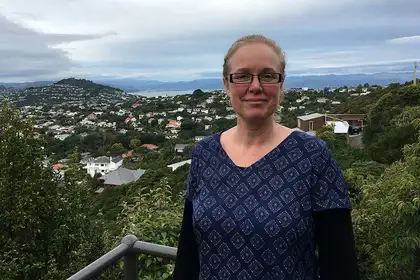
Creative activism specialist Associate Professor Elspeth Tilley says school pupils are engaging in citizenship by marching for action on climate change.
by Associate Professor Elspeth Tilley
There are amazing teachers working within our schooling system to promote critical and creative learning – but in the main, our secondary schooling system is still oriented to what is known as "reproductive education". That is, success is predominantly measured by whether pupils can reproduce what we already know.
The problem is that following what we already know is what got us in this mess. What we need is to encourage a combination of reproductive education (so we can learn from the mistakes of the past) with critical and creative education. That means encouraging young people to ask questions, unlearn assumptions, challenge norms, take creative risks, have experiences outside the classroom and traditional curriculum, learn how to organise, collaborate, communicate, make new networks and connections, and develop skills to imagine and represent novel positions and scenarios.
The young people taking part in this Friday’s school strike to march against climate change are doing just that – essentially, they are on a field trip in applied critical thinking and citizenship studies. This is how democracy works – if we want our young people to be engaged citizens, then we need to support and encourage their engagement with their citizenship.
There is a mounting body of research evidence showing that unexpected and novel solutions are essential to make real social, political, environmental and economic change to our current trajectory – that is, solutions that use creativity and the imagination to envisage a completely different way of doing things. An extensive body of research literature called "standpoint theory" has shown that those who are least ingrained in a system are typically able to best imagine how to do things differently, and furthermore that those who are most disadvantaged by a system are best able to picture how to improve it, because they don’t have a vested interest in maintaining it.
Loaded legacy the future for youth?
Young people as a global group are deeply disadvantaged by our current planetary systems. They are inheriting the legacy of toxicity, ecosystem collapse, disasters, inequality, famine and food wars that my generation will leave behind when we are dead. They will live with it far longer than us, with the worst yet to come. According to standpoint theory, young people are more likely than us to act selflessly and ingeniously in solving what seem daunting and intractable issues. We should be listening to, and facilitating their ideas into real channels of action and influence, not trying to silence them. Young people are a resource. They can help us win against climate change.
My experiences with young people, both over a 20-year career as a university educator and running the Create1World youth creative activism and global citizenship conference, now in its fourth year, consistently show that young people are other-focussed, innovative thinkers who dare to imagine a better world, are committed to values of inclusivity and social justice, and are willing to work hard to make the world a better place.
And yet they have no traction for that energy, insight and courage. They cannot vote: all they have is their voice. If we silence even that – as some are doing by disparaging the march – we are utterly disempowering them. Disempowerment is the last thing they (and we) need right now.
Need for hope in times of fear and despair
A report by UNICEF released in 2017 showed New Zealand has by far the highest youth suicide rate in the developed world. Right now, a sense of hope is crucial – while depression and mental health problems are complex, the overwhelming scope and scale of climate change contributes to a sense of powerlessness. As a young person participating in Create1World 2016 said: “The fact that older people are deciding for us how our world is going to be and we’re the ones who have to deal with the consequences, doesn’t seem very fair.”
Witnessing young people seize their right to be angry about what has been done to their future, and voicing that anger, is a sign of hope. It gives me optimism for the future in a way that none of the slow-grinding bickering of politicians is doing.
The pace of change is not fast enough – the planet is warming faster than we are changing our ways. This is why I unreservedly support the school strike. Young people are modelling the moral imperative: do more, and do it now. I thank them from the bottom of my heart for their courage and their clarity.
Elspeth Tilley is an associate professor in expressive arts at Massey University’s School of English and Media Studies in Wellington, an internationally award-winning playwright of theatre about climate change, and organiser of the youth event, Create1World.